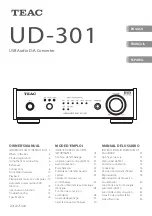
S1 series standard inverter
-170-
4. Try to short GND of the inverter to its ground terminal (PE).
5. Try to add a safety capacitor of 0.1
μF on the power terminal of the upper computer (PLC, HMI,
and touch screen). During this process, pay attention to the voltage of the power supply and the
voltage endurance capability of the capacitor. Alternatively, you can use a magnet ring (Fe-based
nanocrystalline magnet rings are recommended). Put the power L/N line or +/- line of the upper
computer through the magnet ring in the same direction and wind 8 coils around the magnet ring.
7.7.3 Failure to stop and indicator shimmering due to motor cable coupling
Interference phenomenon
1. Failure to stop
In an inverter system where an S terminal is used to control the start and stop, the motor cable and
control cable are arranged in the same cable tray. After the system is started properly, the S terminal
cannot be used to stop the inverter.
2. Indicator shimmering
After an inverter is started, the relay indicator, power distribution box indicator, PLC indicator, and
indication buzzer shimmers, blinks, or emits unusual sounds unexpectedly.
Solution
1. Check and ensure that the exception signal cable is arranged 20 cm or farther away from the
motor cable.
2. Add a safety capacitor of 0.1
μF between the digital input terminal (S) and the COM terminal.
3. Connect the digital input terminal (S) that controls the start and stop to other idle digital input
terminals in parallel. For example, if S1 is used to control the start and stop and S4 is idle, you
can try to connect connect S1 to S4 in parallel.
Note:
If the controller (such as PLC) in the system controls more than 5 inverters at the same
time through digital input terminals (S), this scheme is not available.
7.7.4 Leakage current and interference on RCD
Inverters output high-frequency PWM voltage to drive motors. In this process, the distributed
capacitance between the internal IGBT of an inverter and the heat sink and that between the stator
and rotor of a motor may inevitably cause the inverter to generate high-frequency leakage current to
the ground. A residual current operated protective device (RCD) is used to detect the
power-frequency leakage current when a grounding fault occurs on a circuit. The application of an
inverter may cause misoperation of a RCD.
1. Rules for selecting RCDs
(1)
Inverter systems are special. In these systems, it is required that the rated residual current of
common RCDs at all levels is larger than 200 mA, and the inverters are grounded reliably.
(2)
For RCDs, the time limit of an action needs to be longer than that of a next action, and the time
difference between two actions need to be longer than 20 ms. For example, 1s, 0.5s, and 0.2s.
(3)
For circuits in inverter systems, electromagnetic RCDs are recommended. Electromagnetic
















































